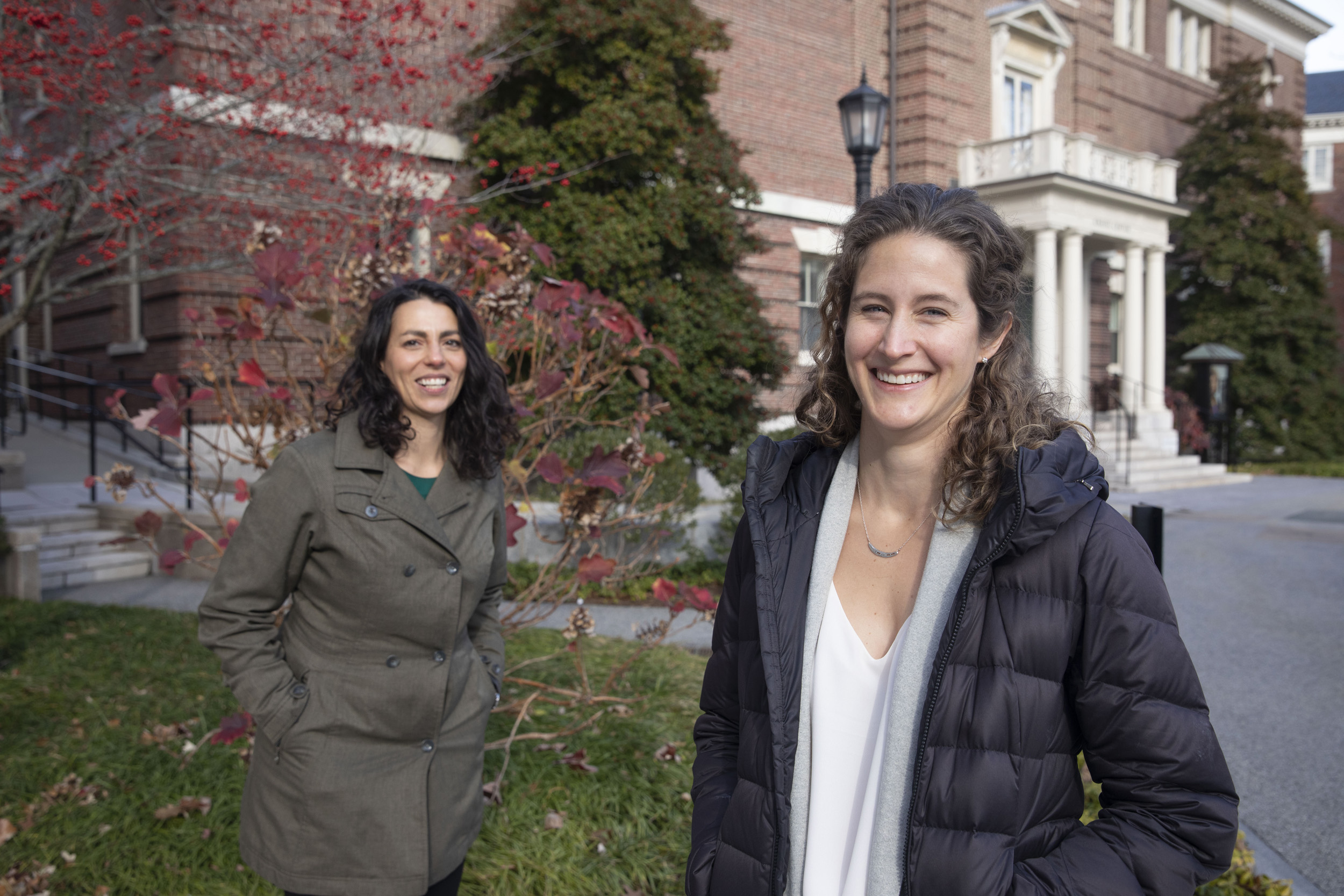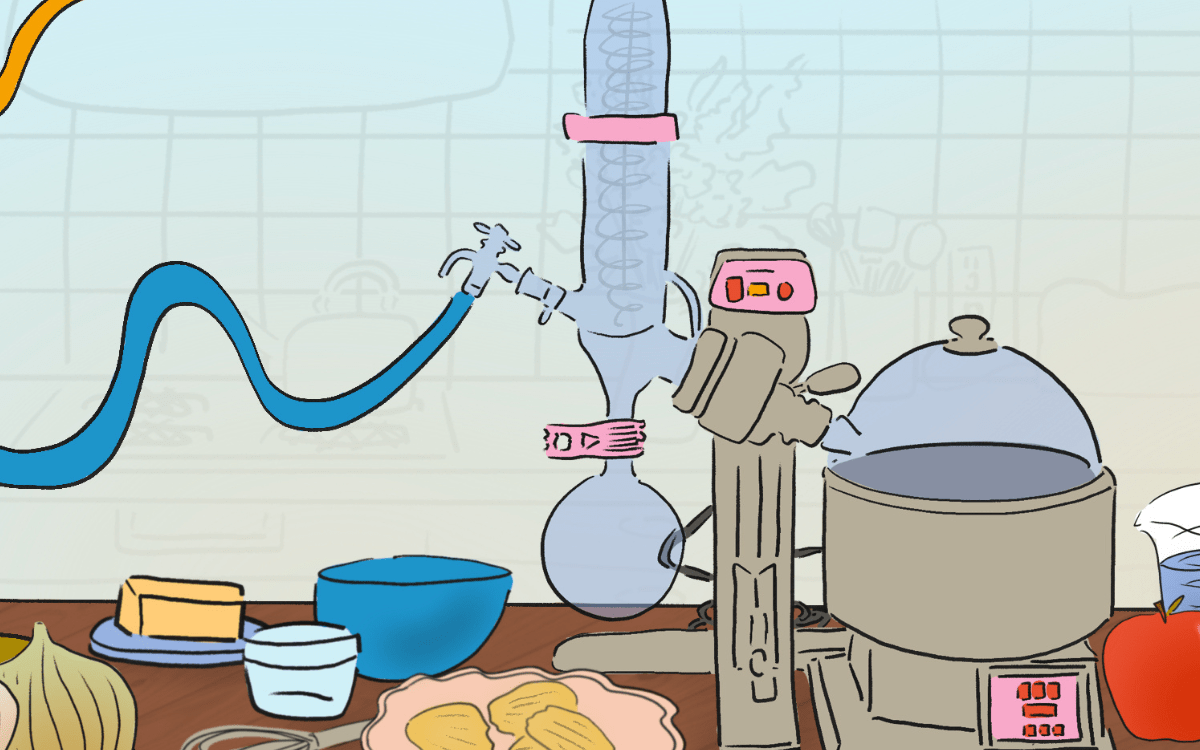
Mei Elansary (left) and Dana McCoy co-authored a study that better determines when the maternal growth or fixed mindset has the most impact on a child’s development.
Kris Snibbe/Harvard Staff Photographer
Turns out smarter kids are made, not born
New study hints parental mindset about potential for growth yields better outcomes starting from very early age
Many parents in past decades believed that intelligence and many other abilities were fixed traits. A child was born smart or not, and little could be done to change that. More recent research has upended that notion, and shown that encouraging parents to adopt a so-called growth mindset leads to better educational outcomes for their children. But it had been unclear at what point such a mindset can impact a child’s life, and new research hints it may start very early.
A recently released study by Mei Elansary, a pediatric specialist at Boston Medical Center, and five other scholars found that a maternal growth mindset could mitigate negative effects of stress on mothers in the early months of a child’s life and promote brain development. The team’s work built on previous research, including that of Meredith Rowe, Saul Zaentz Professor of Early Learning and Development, which showed the positive effects of a growth mindset in mother-child interactions.
“A maternal growth mindset is the belief that you can grow your abilities through work and effort, and that I can help my children learn new things and grow and expand their abilities,” said Elansary. “Conversely, a maternal fixed mindset is the belief that abilities are going to stay the same over time, no matter how hard I work or how much investment as a mom I put into my child’s learning.”
The new inquiry included 33 mothers and their children, who were 12 months of age and part of a longitudinal cohort study on the role of stress and child development. The study was led by Charles Nelson, professor of pediatrics and neuroscience at Harvard Medical School and professor of education at the Harvard Graduate School of Education. The mothers were recruited from the primary care clinic at Boston Children’s Hospital, which serves families who are publicly insured.
The study’s researchers asked mothers about their mindsets and stress levels. Children’s brain activity was observed through electroencephalography. Previous research has shown the negative impact of maternal stress not only on interactions and attachments between mother and infants, but also on childhood brain development.
The new results showed lower brain activity for infants of mothers who felt stressed and had fixed mindsets. In contrast, infants of moms with a growth mindset did not display negative impact.
“We found that [the children of] mothers who had high levels of stress and also held a growth mindset were protected; they were protected against the negative effects of high levels of stress,” Elansary said.
Nelson and Elansary co-authored with Dana McCoy, Marie and Max Kargman Associate Professor in Human Development and Urban Education Advancement at the Ed School; Wendy Wei, a doctoral student who does her work at the Ed School; Lara Pierce of York University; and Barry Zuckerman, professor and chair emeritus of the Department of Pediatrics at Boston University School of Medicine/Boston Medical Center.
Although the study is small, it is the first to look at mindset, infants, and brain development. For McCoy, that is one of the study’s major contributions. Previous studies have examined the links between growth mindsets and positive outcomes in children’s learning, she said.
“What’s exciting about this study is that it shows that mindsets are related to outcomes as early as infancy,” said McCoy. “It does suggest some initial evidence that there are really biological underpinnings for how mindsets become embedded in kids, or how maternal mindsets might become embedded within kids at a very young age.”
But while the study shows that growth mindsets can head off the negative implications of maternal stress, they’re not a panacea for the systemic barriers new parents face, said McCoy.
“We need to advocate for interventions that support growth mindsets, but at the same time, we need to acknowledge that there are huge systemic stressors and barriers placed on new parents, especially in the first year of children’s lives,” said McCoy. “Growth mindsets are not going to solve those.”
What’s necessary is a more systemic approach, McCoy said. “We need better parental leave policies, better public support systems for early care and education, and more supports for health and nutritional access for parents and moms to reduce overall levels of stress,” she added.
Elansary agrees.
“The broader implication of our study is that we might not be able to change the level of stress that mother and child are facing,” she said. “But studies have shown that you can, through relatively brief interventions, encourage parents to have a growth mindset. … If we can help mothers, through interventions, switch from having a fixed mindset to a growth mindset, then that might be a more accessible way of promoting child development.”





